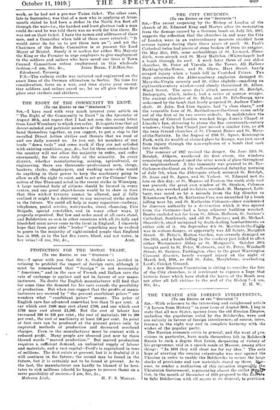PROTECTION FOR THE MOTOR TRADE.
[To THE EDITOR OF THE " SPECTATOR.") SIR,—I agree with you that Sir A. Geddes was justified in refusing to prohibit the import of foreign cars, although it must be remembered that " foreign " is not necessarily " American," and in the ease of • French and Italian cars the rate of exchange is against and not in favour of our manu- facturers. No doubt the English manufacturer will find that for some time the demand for his cars exceeds the possibility of production. But when you suggest that the profits of manu- facturers are secured by " the present exorbitant prices " one wonders what " exorbitant prices " means. The price of English cars has advanced somewhat less than 75 per cent. A car which cost £400 may cost about £700, and one which cost £700 may cost about £1,200. But the cost of labour has increased 100 to 150 per cent., the cost of materials 100 to 300 per cent., the cost of machinery at least 150 per cent. In point of fact cars can be produced at the present prices only by improved methods of production and decreased overhead charges. Even so the manufacturer must be content with a reduced profit. Many people are obsessed just now by those blessed words " massed production." But massed production requires a sufficient demand, an unlimited supply of labour and materials, and a vast capital—Ford's is capitalized in tens of millions. The first exists at present, but it is doubtful if it will continue in the future; the second may be found in the future, but it is certainly not to be found at present. As to the last, the manufacturer can hardly be blamed if he hesi- tates to risk millions (should he happen to possess them) on a mere possibility of success.—I am, Sir, &e.,


































 Previous page
Previous page